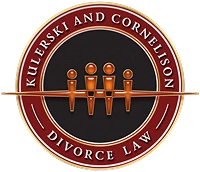Dividing assets during a divorce can be complex, and retirement accounts often represent a significant portion of a couple’s financial future. Understanding how these accounts are handled during divorce proceedings is crucial to protecting your long-term interests. Whether you negotiating a settlement or preparing for litigation, having clarity on this issue can make all the difference.
At Kulerski & Cornelison, our team serves families DuPage and Cook counties. Our Illinois divorce attorneys work with you to properly divide retirement accounts and account for both spouses’ contributions during the marriage. We are here to help.
Why Retirement Accounts Matter in Divorce
Retirement accounts such as 401(k)s, IRAs, pensions, and other employer-sponsored plans often contain years, or decades, of contributions. These assets are considered marital property to the extent they were funded during the marriage. That means both spouses may have a legal claim to a portion, regardless of whose name is on the account.
Equitable Distribution vs. Community Property
States follow different rules when dividing marital assets:
- Equitable distribution states (like Illinois) divide property fairly, though not necessarily equally. Courts consider factors like the length of the marriage, each party’s income, and future earning potential.
- Community property states automatically split marital assets 50/50, including retirement accounts accrued during the marriage.
Illinois follows the equitable distribution model of asset division. Your attorney can help you navigate what this means for you both and how to divide your retirement accounts appropriately.
Types of Retirement Accounts and How They Are Divided
401(k)s and Employer-Sponsored Plans
These require a Qualified Domestic Relations Order (QDRO). This is a legal document instructing the plan administrator to divide funds without incurring penalties. A QDRO allows for:
- Direct transfer of funds to the non-employee spouse
- Avoidance of early withdrawal taxes if rolled into another retirement account
IRAs
Individual Retirement Accounts do not require a QDRO. Instead, transfers must be conducted under a divorce decree or settlement agreement. Improper transfers may trigger:
- Tax penalties
- Loss of tax-deferred status
Pensions and Defined Benefit Plans
Valuing and dividing pensions can be complex. Actuaries often assist in determining the present value. Courts may award:
- A portion of future payouts
- A lump-sum settlement equal to the pension value
If you have a state or federal pension plan of any kind, whether from Illinois or another state, it is crucial to consult an attorney. Dividing these accounts properly can be quite complex.
Common Challenges and Considerations of Dividing Retirement Assets in a Divorce
- Valuation Disputes: Accurately valuing accounts, especially pensions, can be contentious.
- Hidden Accounts: Parties may attempt to conceal assets. Full financial disclosure is critical.
- Tax Implications: Division methods must minimize tax liability. Consulting a financial advisor can be beneficial.
- Vesting Schedules: Some retirement plans may not be fully vested. Courts may divide only the vested portion.

Protecting Your Financial Future
To safeguard your retirement:
- Keep detailed records of account balances, contributions, and growth
- Hire professionals, including family law attorneys and forensic accountants
- Understand long-term implications of dividing retirement assets vs. other marital property
Start discussions about retirement account division early in the divorce process. Proactive planning, helps identify potential issues, encourages fair negotiation, and reduces the risk of future disputes.
Work with an Illinois Divorce Attorney for Help Dividing Retirement Assets
Retirement accounts are more than just numbers on a balance sheet. They represent financial stability and future security. Whether you are divorcing after a few years or decades of marriage, understanding your rights and obligations is essential. With the right strategy, you can ensure a fair division and set the stage for a financially sound future.
At Kulerski & Cornelison, our team can help you with the legal, financial, and familial aspects of your divorce. Contact us today for a consultation of your case.

